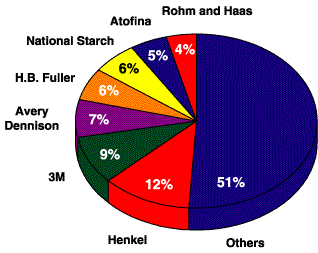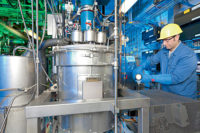
German-based chemical and cosmetics group Henkel — already the world’s leading producer of adhesives — has recently extended its grip on this $21-billion to $23-billion industry via its recent $400-million purchase of Dexter’s Specialty Polymers business through its U.S. subsidiary Loctite.
This deal, according to World Adhesives File 2000-2005 — a recent report published on the global adhesives industry by Market Tracking International (MTI) — will see Henkel increase its market share of the world adhesives industry from 12% to 14%. A combined Loctite (Henkel)/Dexter operation will now have a dominant position in the fast-growing electronics-adhesives market, which is currently experiencing double-digit growth.
The Henkel transaction is the latest in a series of deals that has seen the global adhesives industry consolidate with increasing speed over the last 18 months. Other major deals have seen TotalFina’s $500-million Bostik adhesives business merger with Elf’s $600-million Ato Findley unit to form Atofina.
Another recent chemical merger, which has directly impacted the adhesives industry, is the link-up between Rohm and Haas and Morton International. This deal has combined Rohm and Haas’s $200-million acrylic-adhesives business with Morton’s bigger adhesives operations worth more than twice this amount.
Moreover, further deals of this kind are extremely likely to occur in the future as the global adhesives industry, which has been ripe for consolidation for many years, is now set for a period of further consolidation. Major adhesives companies are now increasingly targeting specific fast-growing market segments and chemistries — traditionally the haven for smaller suppliers — as margins and growth rates in the traditionally large end-user markets for adhesives, packaging and construction slowly disappear.
In particular, opportunities across the specialized adhesives markets, such as electronics, medical and some areas of the automotive industry, are much in demand. Growth in these markets is being driven by strong end-user demand and new product developments that enable adhesives compounds to increasingly serve as direct replacements for mechanical fasteners.
Another area currently experiencing high growth is the pressure sensitive adhesives-label market, where the explosive growth in retail shopping over the Internet has led to greater use of pressure sensitive materials such as labels and bar codes.
According to World Adhesives File 2000-2005, the leading handful of adhesives suppliers, including pressure sensitive companies, already controlled almost half the global market in 1999. Henkel leads the way with an estimated 12% global market share, which will probably increase to around 14% with the purchase of Dexter’s adhesives interests.
Pressure sensitive suppliers 3M and Avery Dennison are ranked second and third, with 9% and 7% shares respectively, followed jointly by National Starch and H.B. Fuller — both at 6%. The newly enlarged Atofina and Rohm and Haas follow closely behind.
